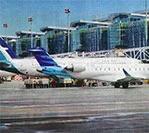As Indonesia surges ahead, it is being courted by the major economies of the world. Apart from the United States and the developed nations of Western Europe, there are now India and China to contend with as well, and China has signalled its desire to play an active and pivotal part in Indonesia’s future development.
The announcement of the Asian Infrastructural Investment Bank (AIIB) by China’s leader Xi Jinping was accompanied by the promise of massive capital investment to the tune of US$6 billion (RM21 billion) to Indonesia, and the expressed wish that Chinese companies will be given the chance to help renovate and develop almost 30 port facilities in the country.
That China wishes to help Indonesia develop its port facilities is also in keeping with President Joko Widodo’s, or Jokowi as he is popularly known, Mari
time Policy and the plan to develop the country’s internal waters as a communications network that will help boost growth, increase mobility and lower costs.
Its impact will be felt in the short-and medium-term, if the new administration can finally break the monopoly control held by the present-day cartels and logistics companies that have controlled the shipping and transport networks within Indonesia’s waters for decades, pushing up costs and thus contributing to the inflated prices of essential goods that are being moved within the country.
The challenge the administration faces, however, is a complex one that has both socio-political and socio-economic dimensions.
A cursory look at some of the island-provinces beyond Java, like Kalimantan, shows that, at present, the state of development in the country is far from equal. The airport at Balikpapan, which is new and modern, makes the airports of other cities on the island, such as Banjarmasin’s and Palangkaraya’s, look old, small and obsolete by comparison.
Likewise, the roads of the island differ from one province to another and from one district to another, giving the impression of a vast region -Kalimantan -that is unequally developed.
Adding to the complexity is the on-going decentralisation process that has been taking place in the country since the 2000s, leading to the rise of local (sometimes ethnic based) forms of provincial politics that adds a further centrifugal strain to the country.
Among the latest developments in this regard is the creation of a new province, North Kalimantan, which will in time be demanding more investment and support from Jakarta, too. (Kalimantan now has five provinces: West Kalimantan, Central Kalimantan, South Kalimantan, East Kalimantan and North Kalimantan.)
With more provincial mouths to feed, the central government will have to balance and weigh the demands being made upon it: Channelling this foreign capital to the major port-cities of Indonesia will be a complicated and contested process as there will be cities and districts that will demand a bigger share of the investment pie than others.
At the most rudimentary level, it is clear that even the Maritime Policy will have a different impact on different parts of Indonesia, with the major port-city -centres (such as· Makassar, Balikpapan and Surabaya, etc.) hoping to gain more, by virtue of their economically strategic and important locations.
Conversely, other parts of the country, such as Nusa Tenggara, may lose out as the development money comes in, and this may in turn lead to resentment and a growing sense of alienation among the people there.
Having to bring together this vast archipelago-nation into a single coherent and inter-connected unit is one of the goals of the Maritime Policy, and this also explains Jokowi’s courtship of powerful countries with the willingness and capability to invest meaningfully in Indonesia’s future.
But for scholars who take a long-term view of the country and who will be following its evolution no matter what path it takes, the decisions that are being made now are of a political and economic nature, and will invariably have long-term political and economic consequences, too.
Judging by the figures that have been mentioned so far, Indonesia’s economic take-off seems imminent, and it remains one of the most important countries in the Asean region to watch for the rest of this decade.
Article by Dr Farish Noor which appeared in New Straits Times, 19 January 2015.





